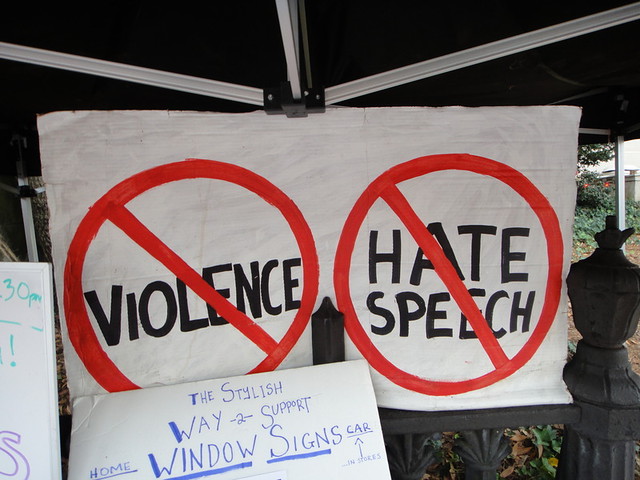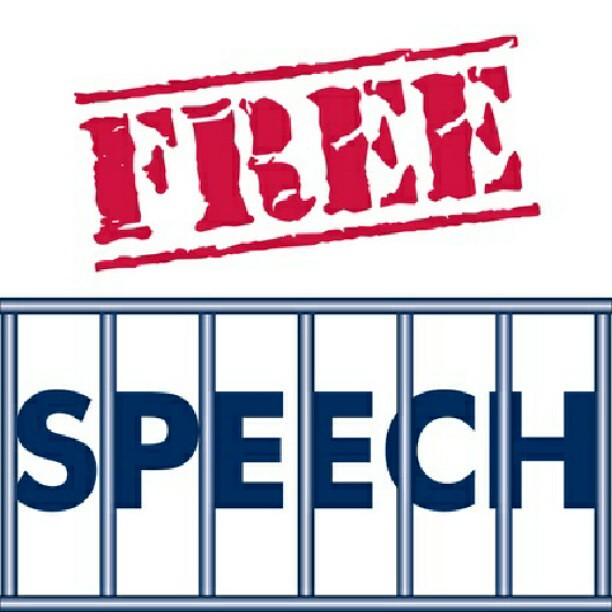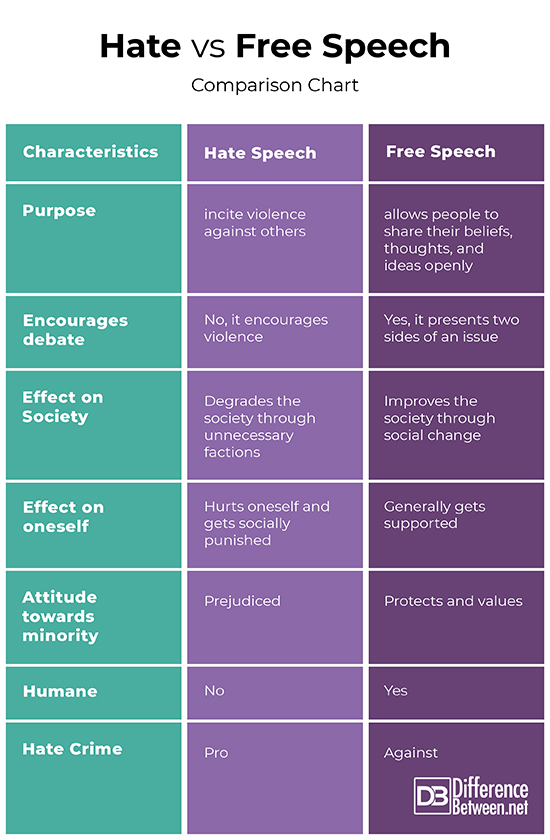Difference Between Hate Speech and Free Speech
Both hate and free speech deal with the expression of thoughts and feelings; this makes their differences blurry for some people. In fact, hate speech is not banned under the United States law as doing so may compromise free speech. Also, these expressions get encouraged by digital development due to the protection of anonymity.
Regarding their differences, free speech is widely known as freedom of speech or freedom of expression while hate speech specifically intends to attack an individual or group of people. Some argue that hate speech should be protected like free speech but some prefer to penalize less tolerant statements. The following paragraphs further present other distinctions.

What is Hate Speech?
Hate Speech is any form of expression that intends to attack a person or a group by inciting violence or prejudice on the basis of attributes such as race, religion, ethnicity, sex, disability, sexual orientation, and others. Some perceive it as a part of free speech and is either legal or illegal depending on the governing administration.
Specifically, an expression is considered as hate speech when it includes:
- Aggressive words
– personal and apt to incite immediate retaliation
- Incitement to Violence
– words that are calculated to result in an actual attack in the future such as genocides, physical bullying, and other forms of hate crime
- True Threat
– threatening or intimidating statements intended to be fulfilled in the immediate future
- Libel or Slander
-both are types of defamation, libel which can take place in any medium, while slander is verbal
- Hostile Environment
-workplaces which create environments that encourage harassment or abuse

What is Free Speech?
Free speech or Freedom of Speech is a widely used right for people to speak without distress regarding retribution, censorship, and government interference. The law states that this freedom may be subject to formalities, conditions, restrictions, and penalties in a democratic society. This right includes freedom for the press to present their opinions and liberty of the citizens to express their grievances through petitions or protests. Though free speech is usually used synonymously with “freedom of expression”, the latter refers to both seeking and receiving information in any medium.
Regarding its origins, most experts believe that the ancient Athenian democratic principle of free speech may have been practiced during the 5th to 6th century BC. Also, the Roman Republic (509 BC-27 BC) cited freedom of speech as one of their values. In 1789, freedom of speech was stipulated as an “inalienable right” during the French Revolution. In 1948, the Universal Declaration of Human Rights specified that every individual has the “right to freedom of opinion and expression”. Today, this right is respected in various laws such as American Convention on Human Rights, European Convention on Human Rights, and International Covenant on Civil and Political Rights.
Difference between Hate Speech and Free Speech
Purpose of Hate vs. Free Speech
Free speech allows people to discuss their beliefs, thoughts, and ideas openly; however, there are limitations to this freedom. On the other hand, hate speech incites harm or violence against others and does not respect pertinent limitations.
Encourages Debate
Free speech encourages debate by liberally but politely presenting the two sides of an issue while hate speech encourages violence by deliberately offending the other party and supporting discriminatory acts.
Effect on Society because of Hate vs. Free Speech
Hate speech creates unnecessary factions within a society due to the aggressive content which may further lead to the community’s deterioration. On the other hand, free speech generally leads to the society’s growth. Though certain divisions may arise, there is still a positive change at the end which fosters healthy social evolution.
Effect on Oneself
Publicly stating homophobic, racist, and other discriminatory remarks under hate speech does not only hurt others but oneself as well. For instance, people who ridicule others also get ridiculed in return and get socially punished. On the contrary, those who engage in free speech are generally not socially punished because they are careful not to cross the line.
Attitude towards Minority
Hate speech discriminates the minority by disseminating offensive remarks while free speech protects the minority by practicing tolerance and respecting the diversity that each group brings. Free speech follows a guideline that prevents the marginalization of individuals.
Humane
Unlike hate speech, free speech is more humane as it aims to respect the dignity of individuals. Hence, this is being encouraged in various social agency settings such as schools and workplaces.
Hate Crime
Unlike free speech, hate speech is more associated with hate crimes as it promotes content regarding abusive acts. For instance, certain mass killings were said to be preceded by hate speech.
Hate vs Free Speech: Comparison Chart

Summary of Hate vs Free Speech
- Both hate and free speech deal with the expression of thoughts and feelings.
- There is a thin line between hate and free speech.
- Hate speech is a form of expression that intends to attack a person or a group.
- Hate speech includes aggressive words, incitement to violence, true threat, libel or slander, and hostile environment.
- Free speech or Freedom of Speech is a widely used right for people to speak without distress regarding retribution, censorship, and government interference.
- The origins of free speech can be traced back to the Athenian democratic principle.
- Hate speech encourages abuse while free speech encourages debate.
- Unlike hate speech, free speech respects limitations, is against hate crimes, and is more humane.
- Hate speech degrades society while free speech improves society.
- Unlike free speech, hate speech often leads to social punishment.
- Unlike hate speech, free speech protects minority groups.
- Difference Between Hematoma and Melanoma - February 9, 2023
- Difference Between Bruising and Necrosis - February 8, 2023
- Difference Between Brain Hematoma and Brain Hemorrhage - February 8, 2023
Search DifferenceBetween.net :
3 Comments
Leave a Response
References :
[0]Image credit: https://www.flickr.com/photos/charlesfettinger/7684998288
[1]Image credit: https://www.flickr.com/photos/98706376@N00/6329770277
[2]Ash, Timothy Garton. Free Speech. London: Yale University Press, 2016. Print.
[3]Ben-Porath, S. R. Free Speech on Campus. Philadelphia, PA: University of Pennsylvania Press, 2017. Print.
[4]Strossen, Nadine. Hate: Why We Should Resist it with Free Speech, Not Censorship. New York, NY: Oxford University Press, 2018. Print.

The article has too much bias, quick to point out homophobia and racism first, as there are many other groups that have traditionally suffered from hate speech. Also, the article largely focuses on hate speech against the minority. Hate speech can also exist from the minority against the majority. It is recommended that the article be re-written to be less biased and include past hate speech (ie., Catholics and Protestants, Irish and Italians, etc.) to help the current readers distance themselves from their own biases in order to read with a more open mind.
People like you suck of earth not worthy of being called american. Hate speech is free speech only when it’s not threatening. You people are Biden lovers who hate america want to enslave people turn this country into a brainwashed North Korea those poor people now we are next i be damned if going let some anti free speech hippies scumbags take my freedoms away. We have right to expose and say anything we want as long as it’s not threatening. I can say I hope Biden does of covid because it’s not threatening it figment free speech and by taking it away your doing exactly what our ancestors feared a America that’s under government control. People like you make me sick get hell out of our country freedom hating hipppies!
Amen brother tell these american hating hippies how it is our country no place for freedom hating freaks go to North Korea you belong with them.